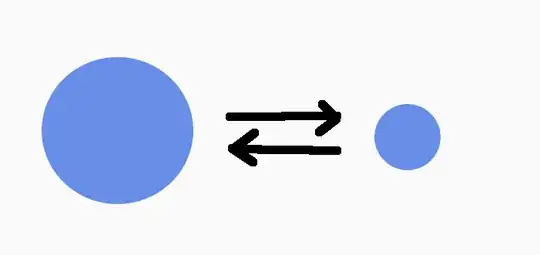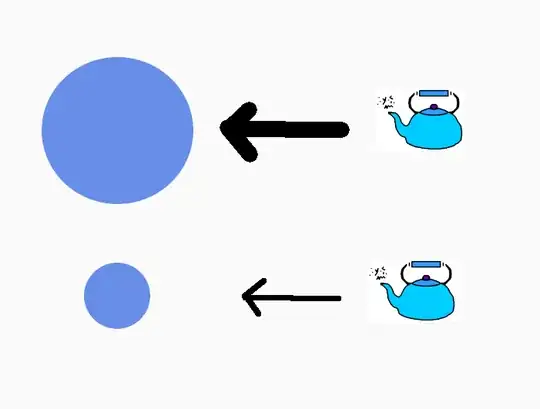By Newton's third law of motion there will be equal and opposite forces of gravity exerted on two objects despite their masses. Hence why does a larger objects exert a larger gravitational pull? In other words why does force of gravity increase with mass?
6 Answers
It is just a small semantic confusion.
Newton's third law tells that the two forces below are equal regardless the masses:
Notice that the two forces are acting on different bodies.
When we say "larger objects exert a larger gravitational pull" we compare them acting on an identical third object.
(opposing forces still there, but not shown)
- 996
The gravitational pull is proportional to both masses: $$F =\frac{G m_1 m_2}{ r^2}$$ So if you increase either $m_1$ or $m_2$ while keeping the other constant then the force will increase.
there will be equal and opposite forces of gravity exerted on two objects
That would correspond to swapping $m_1$ and $m_2$. That would effectively increase the mass of one and decrease the other. So you cannot consider a swap to be just an increase in mass.
- 117,350
There are two different ways of describing gravitation involved here. One is the two-body problem, where there is a force being determined.
The other, is a 'gravitational field' picture, which identifies a single body's gravity contribution in the surrounding space, independent of the presence of other masses.
The gravity field around a large body (Earth) is greater in magnitude (because it is proportional to the mass of Earth) than the gravity field around a cat (which is proportional to the lesser mass of the cat). For practical purposes, like standing upright, we need to accomodate the Earth's gravity but not the cat's. So, we identify the Earth's gravity as the larger influence.
As is the way with felines, the cat will also ignore the gravity due to humans.
- 10,853
By Newton's third law of motion there will be equal and opposite forces of gravity exerted on two objects despite their masses. Hence why does a more massive object exert a larger gravitational pull?
First the first part, you are correct $ {\vec {F}}_{{A\to B}}=-{\vec {F}}_{{B\to A}}$ should always hold, or we a are in trouble.
Let's say you just let an apple ($m$) fall and look at the forces between apple and earth ($M$). Let's say, away from earth ("up") is the positive direction, so force on earth by the apple is: $$F_{{a\to e}}=\frac{G m M}{ r^2}$$ And force on the apple by earth is $$F_ {{e\to a}} =-\frac{G m M}{ r^2}$$ right?
So, you are right opposite and equal forces apply.
So the other part of the question is also answered, a more massive object like earth doesn't pull more on the apple, than the apple does on the earth, it's actually equal and opposite.
But why doesn't earth rush towards the apple, like the apple does towards it, you ask?
Well, you know Newton's laws so apply the 2nd one here. Calculate the acceleration for each individually and see why one would be much much bigger.
(hint: it's really easy to see, you don't need a calculator, just use the fact that the earth is about $10^{25} $ times heavier... but you can of course ask for help...)
And a bonus question: What would happen if the earth was actually pulling the apple more than the other way around?
- 950
Presumably because of approximation, a body with much larger mass may not appear to move, for example in the case of your mass acting on Earth's.
- 131
Consider the force between two cannonballs.
Now add another cannonball beside the first one. That doubles the amount of force on the third cannonball, because both of the first two are acting on it.
Add a third cannonball beside the first one. Three sets of interactions each like what you got when there was only one.
When there's more mass there's more force. There's always that equal and opposite reaction, but it adds up to more.
Incidentally, imagine that gravity doesn't act instantly but only at lightspeed. Then by the time the force from right now arrives at the other weight, the other weight might have moved. The distance and direction could be different. So maybe it isn't an equal and opposite reaction after all?
- 3,146

